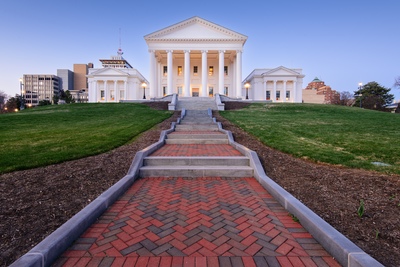
State Government Affairs, Elections & Campaigns
How Lieutenant Governors Are Selected (And Why It Matters)
December 10, 2025 | Bill Kramer
October 19, 2023 | Jose Perez

Key Takeaways:
2023 is an off-year election, so voters in most states won’t be at the ballot box this November. As such, there are significantly fewer ballot measures this year than in 2022. Last year, voters had a say in a total of 140 ballot measures, but in 2023, voters will decide on only 41 ballot measures. Only a few of these measures are related to tax policy, and none of them would constitute significant changes for the broader business community. Below is a list of the tax related ballot measures appearing on the ballot this November.
State | Ballot Measure | Tax Type |
Colorado | Tobacco / Nicotine | |
Colorado | Property | |
Louisiana | Property | |
Louisiana | Property | |
Texas | Property | |
Texas | Wealth | |
Texas | Property | |
Texas | Property |
Texas Proposition 4 stems from HJR 2 from the Second Special Session, and was authored by Reps. Will Metcalf (R), Morgan Meyer (R), Dustin Burrows (R), Richard Peña Raymond (D), and Shawn Thierry (D). Proposition 4 is the product of a month-long negotiation between the state’s two legislative chambers regarding property tax relief. The ballot measure asks voters whether to provide a temporary limit on the maximum appraised value of real property other than a residence homestead (this was an effort to extend property tax relief to the state’s business community), increase the homestead exemption for ad valorem taxes that is assessed by a school district from $40,000 to $100,000, and adjust the amount of the limitation on school district ad valorem taxes imposed on homesteads owned by the elderly or disabled. The compromise did face some criticism that it lacked direct relief for renters.
Texas Proposition 10 was authorized with the passage of SJR 87, authored by Sen. Joan Huffman (R). The proposed constitutional amendment would authorize an ad valorem tax exemption on equipment and inventory held by a manufacturer of medical or biomedical products.
Texas Proposition 2 made it to the ballot with the passage of SJR 64, authored by Sen. Royce West (D). The measure would allow a local option exemption from ad valorem taxation by a county or municipality on the appraised value of real property used to operate a child-care facility.
Colorado Proposition HH was authorized by Colorado bill SB23-303, which was sponsored by Senators Steve Fenberg (D) and Chris Hansen (D) as well as Representatives Chris deGruy Kennedy (D), and Mike Weissman (D). The ballot measure contains several tax provisions including significant changes to the Taxpayer's Bill of Rights (TABOR). If approved, the measure would: (1) create an inflation adjusted local property tax limit, and also allow the limit to be increased through a local ordinance; (2) reduce property tax rates for tax years 2023 to 2032; (3) create two new subclasses of residential property (owner-occupied primary residences and qualified-senior primary residences); (4) reduce property tax rates for certain commercial and agricultural property; (5) adjust deadlines for certain property tax reporting and administration; (6) allow the state to retain more revenue that would otherwise be earmarked for taxpayer refunds; and (7) increase the state revenue cap.
In 1992, voters approved Colorado’s Taxpayer’s Bill of Rights (TABOR) which amended the state constitution to limit certain tax revenue that is retained and spent without voter approval. TABOR has been a pillar of Colorado's financial landscape for decades and, while Democrats have repeatedly tried to undermine it, Proposition HH appears to be the most serious threat in some time.
Magellan Strategies released results of a poll taken from June 21st to July 7th, finding that out of 662 survey respondents, 54% of “uninformed” voters (i.e., respondents that are not familiar with the ballot measure) favored proposition HH and 34% were against. Support for the measure declined once the effects of the measure were explained to participants with approval at 43% and disapproval at 46%.
Louisiana Amendment 3 will be decided on November 18th where voters will be asked to authorize local governments to provide a property tax exemption up to $2,500 for first responders (i.e. certain firefighters, peace officers, emergency medical services personnel, and emergency services dispatchers). The ballot measure was authorized by SB 127, which was authored by Sen. Royce Duplessis (D). Last year’s Amendment 2, which provided a property tax exemption for disabled veterans, was approved 72.9 % to 27.1%.
Louisiana Amendment 4 was approved by voters 66% to 34% during the state’s October 14th election. The measure asked voters whether a nonprofit organization should be denied a tax exemption for residential property that is in such a state of disrepair that it is dangerous to the public's health or safety. Supporters of the bill included New Orleans City Councilwoman Helena Moreno (D), and Reps. Jason Hughes (D) and Alonzo Knox (D) who authored HB 46.
Texas Proposition 3 is a constitutional amendment that prohibits the imposition of an individual wealth or net worth tax. The amendment was proposed in the state’s regular session as HJR 132, authored by State Reps. Cole Hefner (R), Morgan Meyer (R), Cody Vasut (R), Dustin Burrows (R), and Richard Peña Raymond (D). Texas has never imposed a personal income tax, and in 2019 Texas voters approved Prop 4, which amended the state’s constitution to disallow the imposition of a personal income tax.
Colorado Proposition II comes from HB 23-1290, sponsored by Reps. Julie McCluskie (D), Emily Sirota (D), and Senators Dominick Moreno (D) and Rhonda Fields (D). The measure asks voters whether the state should retain and spend revenue received, which were above the estimated revenue to be generated, from a tax increase on cigarettes, tobacco, and nicotine products approved by Proposition EE. The revenue that was raised from the tax hike was used to fund K-12 schools, housing, preschools, health care, and tobacco education. However the difference between the actual revenue generated and revenue estimated, which totals to $23.65 million including interest, can be used only if voters give their approval. If the ballot measure passes, the excess fund will be retained by the state and transferred into the state’s General Fund and the Preschool Programs Cash Fund. If the measure fails, the excess funds will be returned to tobacco and nicotine distributors and wholesalers, and the state’s revenue department will have to lower the tax by 11.53% in order to avoid any further excess revenue from being collected.

December 10, 2025 | Bill Kramer
-238a17-400px.jpg)
December 10, 2025 | Bill Kramer

November 5, 2025 | Bill Kramer